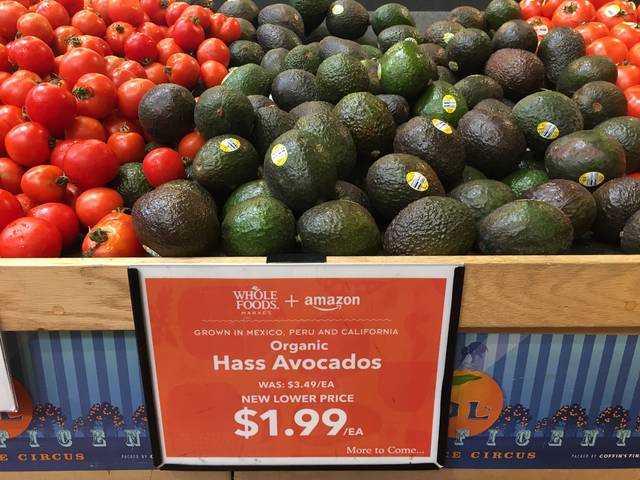Ala Moana resident Aki Rey was shocked to find that the price of her favorite organic bananas at Whole Foods Market in Kahala dropped by a $1 to 69 cents a pound Monday, the first day that Amazon took over ownership of the national health food store.
“I’m still shocked about the price, especially bananas,” said Rey, 37. “I’m a big fan of Amazon. I shop at Amazon a lot. I think that’s great for customers. Everybody likes lower prices.”
Amazon.com Inc. acquired Whole Foods Market Inc. on Monday in a $13.7 billion deal and promptly cut prices by up to 43 percent for some products in a strategy to move away from the perception that the upscale grocery store — often dubbed “Whole Paycheck” — is for the rich and unaffordable for shoppers on a budget.
“It’s always been this ‘Whole Paycheck’ thing. I still think you’re gonna have people whose mindset is, ‘Oh this place is for the rich,’ and they’d rather go to their Times or Foodland (where) they feel more comfortable,” said Kaira Resch, 48, of Wilhelmina Rise, who was shopping Monday at the Kahala store. “Now that Amazon’s taken over, those are incredible prices.”
The price of regular bananas dropped to 49 cents compared with $1.19 a pound before the ownership change. Organic Fuji apples fell to $1.99 from $3.99 per pound. Organic avocados dropped to $1.99 from $3.49 each. A box of organic lettuce was reduced to $3.49 from $5.99.
Honolulu yoga instructor Jenia Kiseleva, 36, who shops at Whole Foods at least once a week, said the price changes are welcome, especially as a way to get more people eating better.
“It will be great for people. We need to bring more people to organic food … to raise more awareness,” she said. “It’s going to be easier for people to believe that it’s OK, it’s possible, it’s not that big of a deal to eat organic.”
Aggressive pricing is a hallmark of Amazon. Rival supermarket chains, which already operate with thin profit margins, are expected to face additional pressure to keep prices down and strengthen their loyalty programs or risk losing shoppers to Whole Foods.
Local health foods store Down to Earth, which is expanding in Kakaako, Pearlridge and Kailua, said Whole Foods’ price reductions are “greatly overstated” and that costs have been cut for only a “handful of products.”
“Many of the price drops are not very significant, less than 13 percent. The price reductions appear to be more about marketing and trying to change their ‘Whole Paycheck’ price image, rather than a significant change in pricing,” said Mark Fergusson, chief executive of Down to Earth. “Down to Earth regularly reduces prices, by much more than Whole Foods has done, on hundreds of items every month as part of our ongoing promotional programs. As more people become aware of the benefits of organic and natural foods, we expect that our business will continue to grow and thrive.”
Fergusson added that Whole Foods’ overall impact on the market hasn’t been significant and that the reality is the chain is only a small player in the national grocery industry — 2 or 3 percent of the total market. However, share prices of grocery chain competitors continued to fall Monday, while Amazon’s prices inched up 0.1 percent to $946.02 per share.
“It’s definitely had a very negative impact on share prices. Definitely, the stock market is anticipating some sort of major impact,” Fergusson said. “But the story’s not over yet. We’re not sure what they’re going to do. For Down to Earth, of course, there’s some uncertainty, but I don’t see a sort of game changer happening.”
Besides lowering prices, Amazon said it will give special savings and in-store benefits to Amazon Prime members, a program that costs $99 a year and also includes free shipping of Amazon products as well as video streaming.
Amazon also plans to add Amazon Lockers at select Whole Foods locations, enabling customers to pick up or send back returns of Amazon.com products at their nearby grocery store.
The New York Times contributed to this report.




